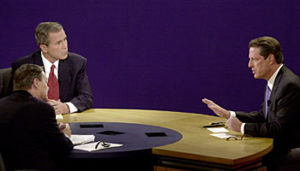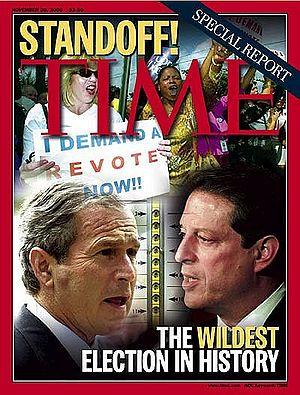United States presidential election, 2000
Contents
Primaries
The contest for the Republican nomination came down to two men: Texas Governor George W. Bush and Arizona Senator John McCain, an ex-POW in North Vietnam. Most Republican leaders endorsed Bush, who was popular with social conservatives. Despite early victories for McCain in the New Hampshire and Michigan primaries, Bush went on to win South Carolina and 9 out of 13 super Tuesday states. McCain dropped out in March after a bitter primary.
Incumbent Vice President Al Gore faced a challenge from former New Jersey Senator Bill Bradley. Bradly ran to left of Gore on universal health care, gun control, and campaign finance reform. Gore eventually trumped Bradly, winning all 50 primary states.
Campaign
As a Vice President for eight years to a popular President during a time when the economy was still believed to be doing well, Gore appeared to have some strong starting advantages. Indeed, he easily won the Democratic primary. But due to Clinton's scandal and impeachment in 1998, Gore sought to distance himself from the sitting President. Clinton, for his part, did little to help Gore. Indeed, when Clinton gave his big speech where he was supposed to pass the baton to Gore, he could never quite do so - instead talking about his own accomplishments and saying little more than 'and Al Gore was there too'. During the campaign political pundits stressed the need of Gore to show that he was the 'alpha dog', but he never quite achieved that breakthrough and it would 'dog' him throughout his campaign. Gore tried to find a balance between adopting the economy and yet steering clear of Clinton's moral failings, but could never quite find the right mix. He was also hampered by the public perception that the economy under Clinton was due more to good fortune than any Clinton initiatives. With Republicans controlling Congress for the last 6 years of Clinton's terms, there was a view that Clinton's role was one of not doing anything to stop the expansion more than doing something to cause it.
Bush also came out of the Republican primary relatively unscathed, and had a 'pedigree' of being the son of a previous President and a strong record as governor of Texas and being well liked by the Latino populace, a group that Republicans had struggled to vote their way. The press began to attack Bush and his speaking style where he had a tendency to sometimes mispronounce or garble words.
Debates
The two candidates had a series of three debates. Gore, a seasoned Ivy league debater, was declared the winner by the press and 'ivory tower' pundits in each of the debates—even as Bush's poll numbers increased. Bush's speaking style, while causing disgust to the elites, played well in middle America who considered him real. Also, the downgrading of Bush's intellect within the press before the debates led Bush to easily exceed expectations. Gore also confounded himself, as he showed a different style in each of the debates leading the American people to wonder who he was. It was especially apparent in the last debate, when, after hearing that he didn't attack enough in the previous debates, Gore actually walked over to where Bush was while Bush was giving an answer and started to question him. Bush gave a quick retort and Gore continued to ask more questions. Bush finally turned to the moderator who restored order. The press was ecstatic after the debate saying that Bush had to cry out to be saved, but the American people had a different view of such blatant breaking the rules and Bush's numbers continued to increase.
October Surprise
While Gore had enjoyed a lead through much of the campaign, a few days before the election Bush's bounce from the debates was enough to put him in the lead by a small margin. It was then that a "surprise" was dropped that Bush had a DUI in 1976, over two decades ago.[1] Blasted on the airwaves continuously before the election itself and with little time to defend it, undecided voters in the last days went heavily for Gore and actually gave him a plurality of the popular vote.
Electoral Count
This was the 16th time in history that a candidate won the Electoral College vote without receiving the majority of the nation's popular vote.[2] The Election Results eventually showed[3]
| Candidates | Popular Vote | Percent | Electoral Vote |
|---|---|---|---|
| George W. Bush | 50,460,110 | 47.9% | 271 |
| Albert Gore, Jr. | 51,003,926 | 48.4% | 266 |
| Ralph Nader | 2,883,105 | 2.7% | 0 |
| Patrick J. Buchanan | 449,205 | 0.4% | 0 |
| Other | 620,892 | 0.6% | 0 |
Florida Recount
- See also: Bush v. Gore
The legacy TV networks, in a rush to be the first to present results, made false calls in Florida. Each network used the same exit poll data, which contained a small math error for Florida. The networks first called Florida for Gore, then for Bush. They should have said it was too close to call. Worse (and some believe, deliberately), the networks called Florida after the polls closed in the Eastern Time Zone part of the state (which is heavily Democratic) but while they were still open in the Central Time Zone part (the Florida panhandle, which is heavily Republican due to the large military bases located there).
One of the potential keys to Gore losing Florida was the unusual style of paper ballot used in Palm Beach County, a South Florida county which has a large Jewish population and is historically a Democratic stronghold.
The ballot style required voters to choose their choice for President/Vice President by punching paper ballots; however, instead of listing all the candidates on one side, the candidates were listed on alternating sides of the ballot (in larger print to assist the large number of elderly voters; the alternating list gave rise to the "butterfly ballot" nickname). The top of the line showing "Gore-Lieberman", however, overlapped with the ballot punch hole for the Reform Party ticket of "Pat Buchanan-Ezola Foster"; notwithstanding a clearly-marked arrow directing voters to the correct punch hole, Buchanan (considered by many a notorious anti-Semite) received an unusually high number of votes in a county with a sizeable Jewish population.
The final official recount in Florida showed Bush the winner by 537 votes. Gore supporters asked the Florida state Supreme Court to again recount votes in some counties where they thought Gore might add votes, but to ignore counties where they thought Bush would gain. The U.S. Supreme Court ruled this strategy illegal, and the result was accepted by Gore, who indeed announced the Florida vote for Bush in his role as Vice President.
The campaigns of both Ralph Nader on the Green Party ticket and Pat Buchanan on the Reform Party ticket gained some media attention during the campaign. Gore's affiliation with Clinton and the racist DLC machine[4] caused critics—Green Party progressive candidate Ralph Nader in particular—to assert that Bush and Gore were too similar, especially on free trade, reductions in social welfare, and the death penalty. "We want to punish the Democrats, we want to hurt them, wound them," Nader's closest advisor said.[5] With the election so close leftists speculated that they had "caused" the result. Democrats never forgave Nader.
There has also been much speculation on what might have happened if there had been recounts under different rules. A consortium of newspapers did an investigation of multiple scenarios. They concluded Gore would have won in some versions and Bush in other versions; ironically, Bush would have won under the recounts that Gore had proposed. In a rare situation in Presidential elections, Al Gore lost his home state of Tennessee to George Bush. Had he carried that state, the whole question of how Florida voted would have been moot, as Al Gore would have received 277 electoral votes.
Aftermath
Unknown to the voting public at the time, the economy had already begun a steep decline before the election. The uncertainty over who would be President and the court battle that ensued caused a steep drop in the stock market leading to the loss of 5 trillion dollars of equity on paper. Such a huge loss would start the next Presidency in a very difficult situation economically and would only be compounded with the complete breaking of the dot-com bubble.
Further reading
- A Blatant Conflict of Interest, Theresa LePore should recuse herself from the Palm Beach vote-count process, John Fund, OpinionJournal, November 12, 2000.
See also
References
- ↑ http://archives.cnn.com/2000/ALLPOLITICS/stories/11/02/bush.dui/
- ↑ It also happened in 1844, 1856, 1860, 1876, 1880, 1884, 1888, 1892, 1912, 1916, 1948, 1960, 1968, 1992, and 1996. It was the first time since Kennedy in 1960 that the presidential winner failed to win a plurality of the popular vote.
- ↑ Leip, Dave. Atlas of U.S. Presidential Elections. Retrieved 7/1/2007
- ↑ http://www.blackcommentator.com/46/46_cover.html
- ↑ Harry G. Levinem "Ralph Nader, Suicide Bomber." The Village Voice May 3, 2004 at [1]


